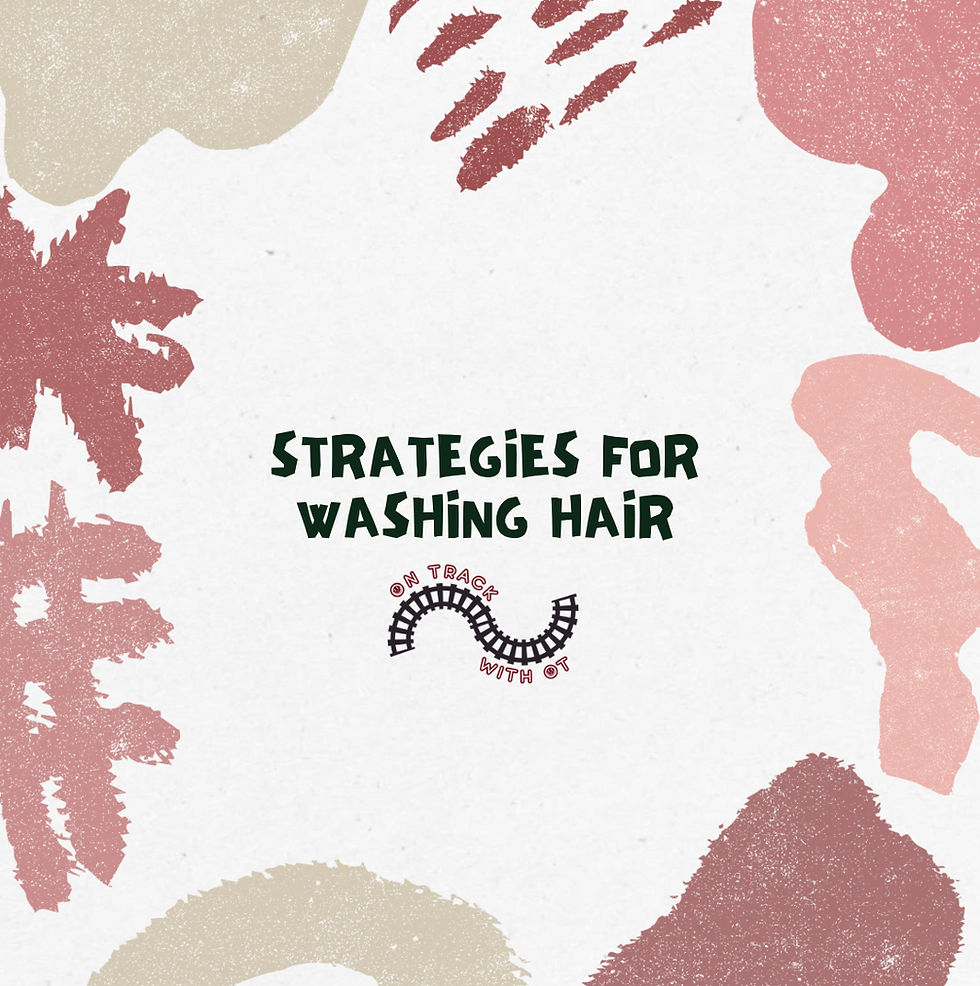Understanding Co-Regulation: Strategies for Supporting Children
- ontrackwithot
- Apr 29, 2024
- 3 min read

In this post, we are going to dive into co-regulation, which is a super important skill to have as a parent (and as a human being in general - we all need a little emotional support sometimes!).
So what is co-regulation? Co-regulation refers to the process of regulating emotions, behaviors, and physiological states with the help of external support from others, typically a caregiver or someone you trust. It involves relying on the presence, guidance, and interaction with another person to modulate and regulate your own internal state.
Think of co-regulation as having an emotional GPS. When you're lost or disoriented, a GPS guides you with clear directions, helping you find your way. In co-regulation, a person you trust acts as the emotional GPS, offering guidance, support, and direction to help navigate the twists and turns of emotions and behaviors.

As a mom of a 16 month old, I feel like I am constantly practicing this skill! “You fell down! That is so frustrating.” “It looks like you’re having a hard time with that, but we can ask mama for help.” “I know it makes you mad when you can’t play with the remote, but we can find something else to play!” It could sometimes feel silly (and extremely obvious to us as adults) to say these things out loud but it's important to verbalize these things to help our kids understand what they are feeling and start to think about ways to problem solve and regulate. Blowing bubbles, singing songs, and offering hugs when he is upset are some go to activities at our house! Lately we have been starting many of our mornings with bubbles + swinging, which have been great regulating tools for him!
Co-regulation plays such an important role in early development, especially in infancy and early childhood when children are still developing their own self-regulation capacities. Over time, through co-regulation experiences, kids learn effective regulation strategies, building the foundation for self-regulation skills that they can apply independently as they grow older. Sometimes it can be hard to know how to support your child where they are, so here are some strategies for co-regulation at each stage:
Infants (0 to 12 months):
Responsive caregiving: Promptly respond to the infant's cues for feeding, diaper changes, and physical comfort to help regulate their physiological needs.
Gentle touch and soothing voice: Use gentle touch, rocking, and a soothing voice to provide a sense of security and comfort, promoting regulation and emotional bonding.
Eye contact and facial expressions: Engage in eye contact and display positive facial expressions to establish emotional connection and attune to the infant's emotional states.
Toddlers (1 to 3 years):
Emotional validation and labeling: Acknowledge and validate the toddler's emotions by identifying and labeling them, helping them understand and regulate their feelings.
Co-regulated play: Engage in play activities together, following the child's lead and joining in their play, providing a supportive and interactive environment.
Simple explanations and modeling: Use simple explanations and model appropriate behaviors and emotional regulation strategies to help toddlers learn by observation and imitation.
Preschoolers (3 to 5 years):
Emotional check-ins: Encourage them to express their emotions and check in with them regularly, providing empathy and guidance in managing their feelings.
Co-regulated breathing exercises: Practice deep breathing exercises together to help them calm their bodies and regulate their emotions.
Social stories and role-playing: Use social stories or pretend play to teach social and emotional skills to help them understand and navigate different situations.
Early Childhood (6 to 8 years):
Emotion coaching: Provide emotional support and guidance by actively listening, validating feelings, and helping problem-solve and regulate their emotions.
Collaborative problem-solving: Engage in joint problem-solving activities, encouraging them to generate solutions and make decisions while providing guidance and support.
Goal-setting and rewards: Assist in setting achievable goals and offer incentives or rewards to motivate and reinforce their efforts in self-regulation.
Middle Childhood (9 to 12 years):
Reflective conversations: Engage in open and reflective conversations, allowing them to express their thoughts, concerns, and emotions while offering guidance and perspective.
Mindfulness practices: Introduce mindfulness techniques, such as mindfulness meditation or body scans, to help them develop self-awareness, attention, and emotional well-being.
Self-monitoring and self-reflection: Encourage them to monitor their own behavior and emotions, reflect on their choices and consequences, and make adjustments for improved self-regulation.
Remember that these strategies serve as general guidelines, and individual children may respond differently (just as us adults do!). It's important to consider the unique needs, preferences, and developmental level of each child when practicing co-regulation. As kids grow, it is important to gradually transition from co-regulation to fostering independent self-regulation skills which we will get into in the next post!




Comments